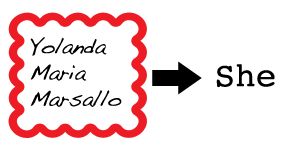What Is a Pronoun?
Everything You Ever Wanted to Know
What is a pronoun?
Here are a few examples: he, she, it, they, someone, who
That means that a pronoun can do all of the things that a noun can do. It can be modified by an adjective, and it can perform any of the noun jobsin a sentence (subject, direct object, indirect object, object of the preposition).
Heck, the word pronoun even has the word noun in it!

Let's look at a few example sentences:
Here is another example:
he is also a motivational speaker.
Notice how this example is a little different than the first one. Here, the noun and pronoun are found in the same sentence.
Remember how the definition of a pronoun is a word that takes the place of a noun? Well, from the above example, you can see that the pronoun hetakes the place of the noun Erik Weihenmayer
We could have written the sentence like this:
But that doesn't sound good!
Thank goodness for pronouns!
If we didn't have them, we would have to keep saying Erik Weihenmayerevery time that we wanted to refer to him. (Oh- look! I just used the pronoun him to refer to Erik Weihenmayer!)
So, what is a pronoun? Close your eyes and see if you can remember the definition!
Want this information at your fingertips?
Check out the Nouns and Pronouns Workbook.
Antecedents
An antecedent is the noun that a pronoun is replacing or referring to. In the examples above, Erik Weihenmayer is the antecedent.
What's missing from the following example?
You should be asking yourself WHO is HE? You don't know because I have not given you the antecedent.
If I said:
Now you should know who I am talking about because I have provided the antecedent for he, Thomas Jefferson.
However, not all pronouns have antecedents. Sometimes we don't know whom exactly we are talking about. For instance:
Maybe you can use that to your advantage. As in:
It certainly wasn't YOU, right?
WARNING: Knowing the above information and looking at the list of pronounsshould be enough for you to answer that burning question, "What is a pronoun?"
If you would like to go more in-depth, read on about the different types of pronouns. BUT, don't get bogged down. Just knowing how to answer, "What is a pronoun?" and a few examples should be all that you need right now.
Got it? Good.
Types of Pronouns
There are many different types of pronouns. Below you will find a short description and a few examples of each. For more examples, please see thelist of pronouns.
Personal Pronouns
These are the pronouns that we use the most, and there are not too many of them. Here they are:
For each of these pronouns, we can tell the person (Who is speaking?), thenumber (Is the pronoun singular or plural?), and gender (Is the pronoun masculine, feminine, or neuter?).
For instance, she is third person (the person being spoken about), singular, feminine while we is first person (the people speaking), plural, neuter.
Relative Pronouns
These little guys are the most advanced type of pronoun on this list. Theyintroduce relative clauses also called adjective clauses. In a way, they sort of act like conjunctions because they connect the relative clause to the rest of the sentence.
Although they sort of act like conjunctions, they are still pronouns. Why?
Well, what is a pronoun?
That's right- it is a word that takes the place of a noun. And that is what the relative pronoun does. It takes the place of or refers to a noun.
That refers to the noun cookie, and it introduces the relative clause that I want to eat.
Demonstrative Pronouns
There are only four demonstrative pronouns!
We use these to point out particular people or things.
Sometimes demonstrative pronouns are used before nouns. In these cases, they are adjectives - not pronouns. (Remember, an adjective is a word that describes a noun.) They are pronouns when they are used alone and are not modifying a noun.
Bring me that. (pronoun)
Indefinite pronouns
The prefix in- means not. Indefinite pronouns are just that - they are notdefinite. This means that we don't know something about them. We do not know whom or what they refer to. (anyone, something, all, most, some...)
Everyone looked at me. (Who exactly? We don't know.)
Sometimes indefinite pronouns are used before nouns. In these cases, they are actually acting as adjectives, not pronouns. For example:
Both smiled at me. (pronoun)
Reflexive and Intensive Pronouns
Both of these types of pronouns end in -self or -selves. (himself, herself, myself, itself...) They have different names depending on how they are being used.
A reflexive pronoun is used to refer to the subject of the sentence.
An intensive pronoun is used to emphasize another noun.
Interrogative Pronouns
These are pronouns that are found in questions. Another name for a question is an interrogative sentence. Interrogative pronouns often begin interrogative sentences:
Which jacket should I wear?
Other interrogative pronouns include: what, whom, whose.
Possessive Pronouns
Possessive pronouns show ownership. (His, hers, your, theirs...) Another word for ownership is possession.
When possessive pronouns are used before nouns, they are actually being used as adjectives - not pronouns.
That car is ours. (pronoun)






